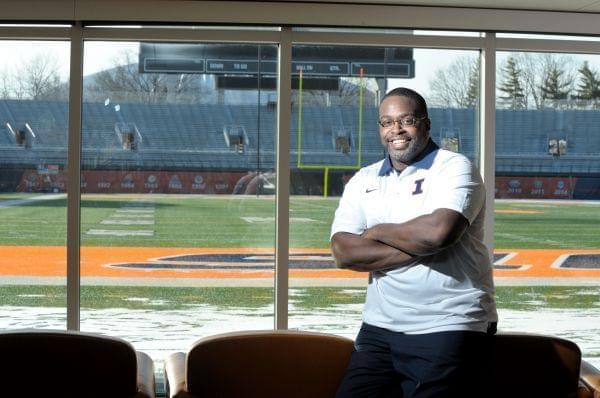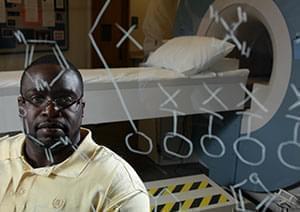From The Field To The Lab, Researcher Tackles Athletic Brain Injuries

Kevin Jackson Beckman Institute
With the Super Bowl on Sunday, all eyes are on football. The sport also happens to be Kevin Jackson’s area of scientific expertise. He came to the University of Illinois to play football while pursuing a career in science, and now he’s developing a cooling helmet that may help with athletes’ head injuries.
Through his research with the University’s Beckman Institute and the Athletics Department, Jackson wants to reduce the side effects of concussions and other brain injuries for athletes.
You know, your life is bigger than that game. ... You have to think about yourself when you wake up in the morning. Am I going to be ok 15, 20 years from now.”Kevin Jackson
A concussion, Jackson said, will affect each person differently.
“With an ACL tear, you know it’s normally a six month recovery, so you know exactly what you are going to get. With a concussion, it’s hard to say where you got hit at and how long this person will be out.”
One thing that is the same player to player, though, is that “heat can be a very bad thing for your brain after a concussion or after a head injury,” said Jackson. “So what we’re trying to do is bring your temperature back down to normal thermia, which is the normal 98.6, [to] bring you back to normal thermia so that your brain can start working on not getting rid of the heat, but actually worry about doing the repair it has to do to itself.”
It appears cooling also may have additional benefits for the brain after an injury.
Jackson has two different helmets. The lower-tech version looks like an ice pack fashioned into a helmet shape and Jackson has enough of those for multiple players to routinely put one on after practice or a game. He also has two longer term cooling helmets that are attached to a battery and continuously pump cold water through the helmet. Those can last for around six hours, running on batteries.
While the cooling helmets help, they aren’t a complete fix to the long term side effects of numerous head hits and concussions. To properly protect players, Jackson said, the culture has to continue to change.

Kevin Jackson
Compared to when he played from 1990-1994, Jackson said coaches, players, health professionals and the players’ families are all better educated about how head hits impact players’ health and what to look for. Parents and coaches staying vigilant can be particularly useful, he says, because they “are around these kids every day versus a scientist just seeing it once out of the blue.”
Parents can also spot problems a doctor might not catch.
So should kids play football?
“I think they should. I think you shouldn’t pull kids out,” said Jackson. “I think it’s a fun sport to play, and it teaches a lot of things for young boys and young people who play the sport itself.”
Jackson said he does think children under age ten shouldn’t play, because they don’t have an understanding of proper techniques.
And, particularly when kids are playing, he hopes parents and coaches are properly educated on concussions and how they work.
The ultimate responsibility lies with players, said Jackson, likening it to military veterans.
“That’s a hard thing for an athlete to say – ‘I’m gonna pull myself out’ – because you don’t want to let your teammates down,” he said. “But you also have to realize that it’s a game. Your life is bigger than that game. Win or loss you gotta take the consequences of whatever happens, but you have to think about yourself when you wake up in the morning and ask: Am I going to be ok 15, 20 years from now?”

